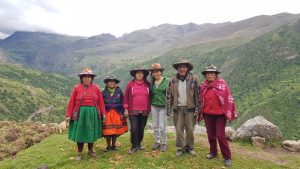
Vanier Scholarship win for Political Science student
August 6, 2020
Q&A with 2020 Vanier Scholar Yojana Miraya Oscco
Congratulations to PhD student Yojana Miraya Oscco who has won a prestigious Vanier Canada Graduate Scholarship (SSHRC). Launched in 2008, the program enables Canadian institutions to attract and retain highly qualified doctoral students in the sciences, social sciences and humanities. Chosen for their demonstration of academic excellence, leadership and research potential, recipients are awarded $50,000 per year, for up to three years of study.
Can you tell us about your research? I study how Indigenous political and community organisations in the Andes are affected by extractive industries such as mining corporations. My research interests navigate broad disciplines, including Indigenous political studies, political ecology and Andean food sovereignty. My work expands on my master’s degree which focused on the effect of mining corporations on Andean communities which I hope to expand on through further comparative studies across Latin America.
How do you feel about winning the Vanier Scholarship award? I’m delighted to have received this award! On a personal level, it is very encouraging and boosts my confidence academically. The financial security that it brings allows me to devote more time to in-depth research and knowledge sharing on Andean communities. I am really grateful to have received the Vanier Scholarship because it validates that this type of work is crucial for addressing complex sustainability challenges, and this support gives me the opportunity to explore new avenues that integrate hemispheric approaches of Indigenous studies across the Americas.
Why is your research important and why did you choose to pursue this area? This research is important because mining companies supported by the state are increasingly seeking access to communally held lands in the Andes. How communities are organised politically will determine their ability to reject or define the terms of access which mining companies have to communal lands. The skills and knowledge I have gained throughout my work have helped me empower others to avoid exploitation. I hope this research will ultimately enable these communities to maintain their self-sufficient and autonomous lifestyles. I chose this area because in recent years I have seen the rapid increase in state-supported mining corporations entering ancestral Indigenous held lands. These Indigenous communities, including my own community and particularly those being exploited by powerful mining corporations, should be included in the decision-making processes of state and corporate actors.
What are you hoping to do after you graduate? I would like to continue my research on projects with Andean communities and work on subjects such as sustainable development and Andean food politics. I plan to continue my education, not just academically, but through the application and integration of my learning into everyday life.
Photo: Yojana with her family in Peru.